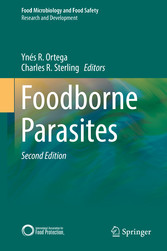Suchen und Finden
Foodborne Parasites
The globalization and commercialization of the food system has unintentionally led to the introduction of new foodborne parasites in countries worldwide. Fortunately, advances in detection and control are providing the basis for a better understanding of the biology and control of parasitic infections, and this in turn will likely contribute to the reduction and hopefully elimination of parasitic foodborne outbreaks.
Building on the first edition, this completely revised second edition of Foodborne Parasites covers the parasites most associated with foodborne transmission and therefore of greatest global public health relevance. The volume examines protozoa and their subgroups: the amoeba, coccidia, flagellates and ciliates. Chapters also address Trypanosoma cruzi, recently recognized as an emerging foodborne protozoan. The helminth section is expanded to cover teniasis, cysticercosis, hydatidosis, and the trematodes and nematodes including Angiostrongylus, which is present worldwide. Finally, the editors examine the burden and risk assessment determinations that have provided a scientific framework for developing policies for the control of foodborne parasites.
Ynes R. Ortega is Associate Professor in Food Parasitology at the Center for Food Safety, University of Georgia. Her research focuses on detection, prevention and control of foodborne parasites. Dr. Ortega participated in the FAO/WHO expert team addressing prioritization of foodborne parasites for risk management. She is a science advisor for FDA-SRL, member of the Editorial Board of the Journal for Food Protection and the SS-AOAC Executive Committee.
Charles R. Sterling is Professor Emeritus and past Director of the School of Animal and Comparative Biomedical Sciences, University of Arizona. His research has primarily focused on intestinal protozoan parasites of humans including Cryptosporidium, Giardia and Cyclospora. His lab developed immunodiagnostic assays to detect Cryptosporidium and Giardia infections. He has taught numerous courses of Parasitology.
Building on the first edition, this completely revised second edition of Foodborne Parasites covers the parasites most associated with foodborne transmission and therefore of greatest global public health relevance. The volume examines protozoa and their subgroups: the amoeba, coccidia, flagellates and ciliates. Chapters also address Trypanosoma cruzi, recently recognized as an emerging foodborne protozoan. The helminth section is expanded to cover teniasis, cysticercosis, hydatidosis, and the trematodes and nematodes including Angiostrongylus, which is present worldwide. Finally, the editors examine the burden and risk assessment determinations that have provided a scientific framework for developing policies for the control of foodborne parasites.
Alle Preise verstehen sich inklusive der gesetzlichen MwSt.












